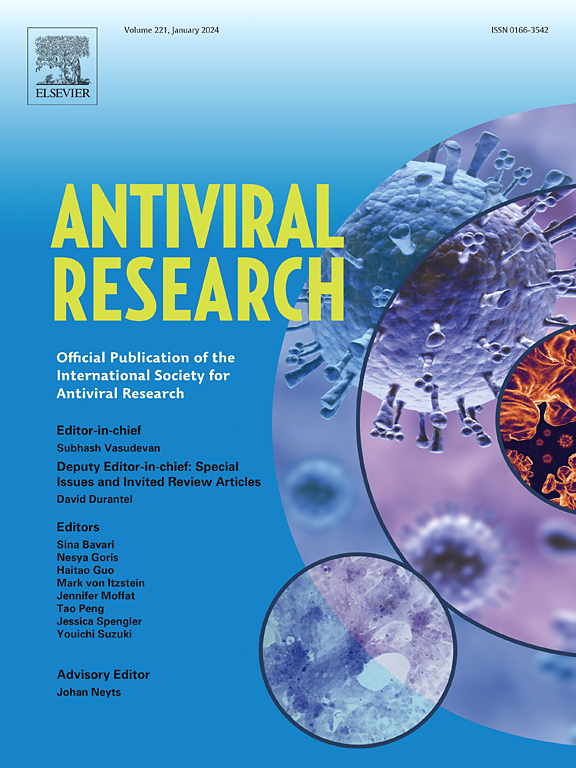Functional characteristics of plitidepsin as an antiviral treatment against monkeypox virus infection
IF 4.5
2区 医学
Q1 PHARMACOLOGY & PHARMACY
引用次数: 0
Abstract
Monkeypox virus (MPXV), closely related to variola virus, causes mpox, a zoonotic disease traditionally endemic to Central Africa. However, recent outbreaks have increased human transmission of MPXV clades. In 2022, global MPXV spread was linked to clade IIb, whereas in 2024, the more pathogenic clade Ib became predominant. These trends raised concerns about sustained human transmission, prompting the WHO to declare mpox a Public Health Emergency of International Concern. Despite the availability of smallpox vaccines, their protective efficacy against mpox remains limited. Additionally, the limited efficacy of current smallpox antivirals, such as Tecovirimat and Brincidofovir, alongside growing concerns about the emergency of tecovirimat resistance mutants, underscores the need for new therapeutic options. Given these challenges, novel antiviral strategies with different mechanisms of action are urgently needed to control MPXV outbreaks. Plitidepsin, a cyclodepsipeptide drug initially approved for cancer treatment, has demonstrated potent antiviral activity against multiple viruses by targeting eukaryotic elongation factor 1 alpha (eEF1A). Here, we have evaluated the antiviral activity of plitidepsin against MPXV infection. In cultured cells, plitidepsin exhibited strong antiviral effects, with a favorable therapeutic index and low cytotoxicity. In CAST/EiJ mice, a highly susceptible MPXV model, plitidepsin significantly reduced viral replication in the lungs. Additionally, treated mice displayed a marked reduction in inflammatory lung lesions and proinflammatory cytokines, suggesting immunomodulatory effects. These findings indicate plitidepsin as a promising candidate for mpox treatment. Further studies are needed to explore its potential as a standalone or combination therapy, supporting clinical evaluation for mpox treatment.
多重抑郁素抗病毒治疗猴痘病毒感染的功能特点。
猴痘病毒(MPXV)与天花病毒密切相关,可引起麻疹,这是一种传统上在中非流行的人畜共患疾病。然而,最近的疫情增加了MPXV分支的人间传播。在2022年,全球MPXV传播与IIb分支有关,而在2024年,致病性更高的Ib分支占主导地位。这些趋势引起了人们对持续人际传播的担忧,促使世卫组织宣布mpox为国际关注的突发公共卫生事件。尽管有天花疫苗,但它们对m痘的保护作用仍然有限。此外,目前的天花抗病毒药物,如特可维玛和Brincidofovir的疗效有限,加上对特可维玛耐药突变体紧急情况的日益关注,强调需要新的治疗选择。鉴于这些挑战,迫切需要具有不同作用机制的新型抗病毒策略来控制MPXV的暴发。Plitidepsin是一种最初被批准用于癌症治疗的环抑郁肽药物,通过靶向真核延伸因子1 α (eEF1A),已经证明了对多种病毒的有效抗病毒活性。在这里,我们评估了plitidepsin对MPXV感染的抗病毒活性。在培养细胞中,plitidepsin表现出较强的抗病毒作用,具有良好的治疗指数和较低的细胞毒性。在CAST/EiJ小鼠(一种高度易感的MPXV模型)中,plitidepsin显著减少了病毒在肺部的复制。此外,治疗小鼠的炎性肺病变和促炎细胞因子显着减少,表明免疫调节作用。这些发现表明plitidepsin是一种很有希望的m痘治疗候选药物。需要进一步的研究来探索其作为单独或联合治疗的潜力,以支持m痘治疗的临床评估。
本文章由计算机程序翻译,如有差异,请以英文原文为准。
求助全文
约1分钟内获得全文
求助全文
来源期刊

Antiviral research
医学-病毒学
CiteScore
17.10
自引率
3.90%
发文量
157
审稿时长
34 days
期刊介绍:
Antiviral Research is a journal that focuses on various aspects of controlling viral infections in both humans and animals. It is a platform for publishing research reports, short communications, review articles, and commentaries. The journal covers a wide range of topics including antiviral drugs, antibodies, and host-response modifiers. These topics encompass their synthesis, in vitro and in vivo testing, as well as mechanisms of action. Additionally, the journal also publishes studies on the development of new or improved vaccines against viral infections in humans. It delves into assessing the safety of drugs and vaccines, tracking the evolution of drug or vaccine-resistant viruses, and developing effective countermeasures. Another area of interest includes the identification and validation of new drug targets. The journal further explores laboratory animal models of viral diseases, investigates the pathogenesis of viral diseases, and examines the mechanisms by which viruses avoid host immune responses.
 求助内容:
求助内容: 应助结果提醒方式:
应助结果提醒方式:


